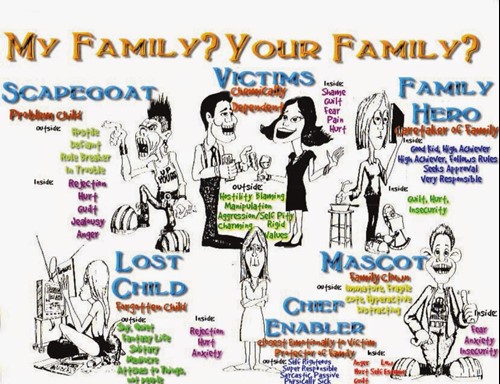I have counseled many adolescents, teens and young adults from the ages of 10 until 17. Throughout my experience with these clients I have seen a pattern in the family over or under-involvement and how it affects the client's outcome. I believe in family systems theory which discusses (in a nutshell) how individuals cannot be understood in isolation from one another, but rather as a part of their family. This means that parents have an affect on the issues their children are being seen for most of the time. You have heard the phrase "this didn't happen in a vaccuum"? That refers to the fact that an adolescent, teen or young adult's behavior is a product of their environment, biological factors, socioeconomic factors, emotional health and psychological health.
For the sake of this post I would like to focus on both the biological as well as the environmental factors that I see when counseling this age. It is important that parents understand that their children may have developed issues because of the ways in which they were raised, behaviors were modeled to them, and even genetic makeup. Parents will often bring their child to therapy and expect the therapist to "fix" them but are not always willing to participate in the process as part of the team. It is not always smart or in the best interest of the client to involve the family ie: in cases of abuse or neglect, however it usually yields the best long term results for quality of life improvement.
The environment that our kids live in refers to their home life. This subdivides further into: how conflict is resolved, language that is used, how are they modeling their relationship with one another to the children, what are the messages you are sending your children about love, responsibility, success and expressing their emotions and even if there is substance abuse by one or both parents. All of these factors excluding many others, can affect the way our children see the world and learn to behave or cope in it. If there is a lot of fighting at home, a child will usually be more aggressive, or can even withdraw depending on the role they take in the family. We see roles develop in dysfunctional families (which by the way we are ALL a part of). The roles are listed in the graphic at the bottom but discuss ways that children learn to communicate their emotions.
There are also possible genetic and biological factors that play into an issue a child may present in therapy. The most commonly studied are bipolar disorder, addiction, schizophrenia and anxiety. These are studied as "pre-dispositions" not a guarantee that the child will also experiences any of these disorders. However the reality of the susceptibility is important to pay attention to. That is not saying that you are hurting your child if you have a genetic history of one or more of these issues, but it is worth considering when you are raising your child and having conversations about risks if they drink etc. You can ALSO play a huge role in preventing these things from being triggered through the environment you create.
All of that is a long way of saying that there are ways you can help and hurt your children during the therapeutic process as well as before it begins. It is both a "cool" responsibility that you are able to influence your children in a positive way, as well as a burden that weighs heavily on some parent's hearts. The most success that I have seen with teens, adolescents and young adults come when their families are involved in one way or another in the process. This can look like family therapy sessions, individual sessions, couples therapy with the parents or even short consultations with the parents to remain on the same page. We must remember that we TOO came from a family which most likely had dysfunction in it and that OUR behaviors are also a product of it.
You can help by being involved in your child's therapy in the way that the therapist believes is best for the client. This means not being over involved and wanting to know every detail, because those details are reserved for the client and therapist's private conversations to protect feelings of safety; but to ask questions of how you can help and what you can do differently. Conversely you can hurt your child's ability to heal by not humbling yourself to hear that you may be part of the problem and therefore attempting to be part of the solution. Ask the tough questions, but do not shy away from being challenged if it will help your child in the end. It is OKAY that we have all developed habits from long years of poor parental modeling, but we have a chance to help our children and to stop the cycle!
If you have further questions, please feel free to contact me at 314-252-8683 or inspirechangestl@gmail.com. 
